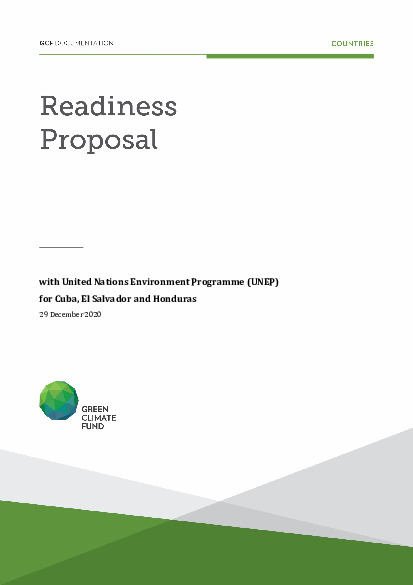Regional Project for Leapfrogging to Energy-Efficient and Climate Friendly Air Conditioners in Cuba, El Salvador and Honduras

Regional Project for Leapfrogging to Energy-Efficient and Climate Friendly Air Conditioners in Cuba, El Salvador and Honduras
According to the analysis conducted by UNEP’s United for Efficiency’s (U4E) initiative for cooling products, the technological transition to more energy-efficient and climate-friendly refrigerators and room air conditioners in the residential sector in Latin America would provide the following potential savings: emissions reduction of over 35 million tonnes of CO2eq from avoided burning of fossil fuels, more than 54 TWh of electricity, and over $ 6 billion USD savings in electricity costs.
This is especially the case for Central American and Caribbean countries, given their particular geographical, biophysical and topographic characteristics, that make them extremely vulnerable to global climate change, and thus, temperature rise. For instance, the household demand for room air conditioners in Cuba, El Salvador and Honduras is expected to increase steadily to reach 3.5 million units by 2030 - a 51% increase from 2020 installed stock. The growing demand for cooling products will increase electricity consumption, which will, in turn, strain the three countries electrical grid and intensify direct and indirect CO2 emissions. Additionally, neither Cuba, El Salvador and Honduras have local manufactures of air conditioners and thus, import all needed cooling products. The importation of inefficient room air conditioner appliances and the large local market for second-hand products are the biggest hurdles to pursuing more sustainable cooling solutions. The three countries have an excellent opportunity to achieve savings ranging from 30% to 60% in the consumption of their electric bill in air conditioning appliances with the implementation of measurements that foster the adoption of more efficient technologies.
Although multiple efforts have been made to advance energy efficiency in each country, there remain several gaps in their regulatory framework to achieve a sustainable market transformation. Therefore, it is critical to establish a strong policy and regulatory framework and promote higher efficiency appliances. Cuba, El Salvador and Honduras are already exploring Minimum Energy Performance Standards (MEPS) and labels for room air conditioners. Still, it has been observed that current MEPS in place are outdated (for example being less ambitious than the U4E Model Regulation Guidelines) and/or do not fully cover the scope of the products imported in the market. Moreover, robust and up to date Monitoring, Verification and Enforcement (MVE) systems and enforced product labelling as well as efficient customs control are fundamental for a successful market transformation. The lack of capacity and framework for implementing MEPS and labels on energy- efficient and climate-friendly room air conditioners as well as low awareness on why and how to purchase higher efficiency cooling products inhibit the countries to make progress on such transformation.
The project aims to help the three countries leapfrog to superior cooling solutions. It will follow a three-pronged approach: enhancing stakeholder capacity for pursuing strategic priorities, implementing a framework for MEPS and labels for room air conditioners appliances, and creating greater knowledge sharing and learning for consumers from the residential and public sector on purchasing efficient cooling products. Specifically, a high-level Policy Working Group (PWG) will be established along with the development of capacity building events for pertinent stakeholders to enable successful planning and implementation. National Monitoring, Verification and Enforcement frameworks for MEPS and labels will be developed to oversee products sold in the market effectively.
The outcome of the project will be shared with other countries in the Latin America and the Caribbean Region to amplify the impact. The project will lead to less pressure on the electricity grid, lower CO2 emissions and lower GWP refrigerant being used in Cuba, El Salvador and Honduras. This will contribute significantly to achieve their climate change goals stated in the National Determined Contribution (NDC) and related ambitions for economic development. The implementation of the project will provide benefits to a wide range of stakeholders. These include policymakers, technicians and professionals in public sector institutions – Ministries of Energy, Environment and Science, customs offices, national laboratories, standardization and quality institutions and procurement bodies –as well as importers/manufactures from the private sector, and final users of room air conditioners.
Moreover, this project will serve as the starting point to implement similar programs to replicate the described approach in neighbouring countries. Ultimately, the objective is to converge towards common regional or sub-regional standards and to promote other energy-efficient and climate-friendly products, thus, achieving greater GHG reductions. Some of these products include lighting, distribution transformers and electric motors - products that together with cooling appliances consume over half of the world ́s electricity. Results and lessons learnt will be shared in other countries to replicate the adoption of recommendations and thus align performance standards in the same region, which will highly benefit the commercial supply chain, simplify administrative burdens, allow the effective use of resources and ultimately decrease energy-efficient product and operational costs for all parties.